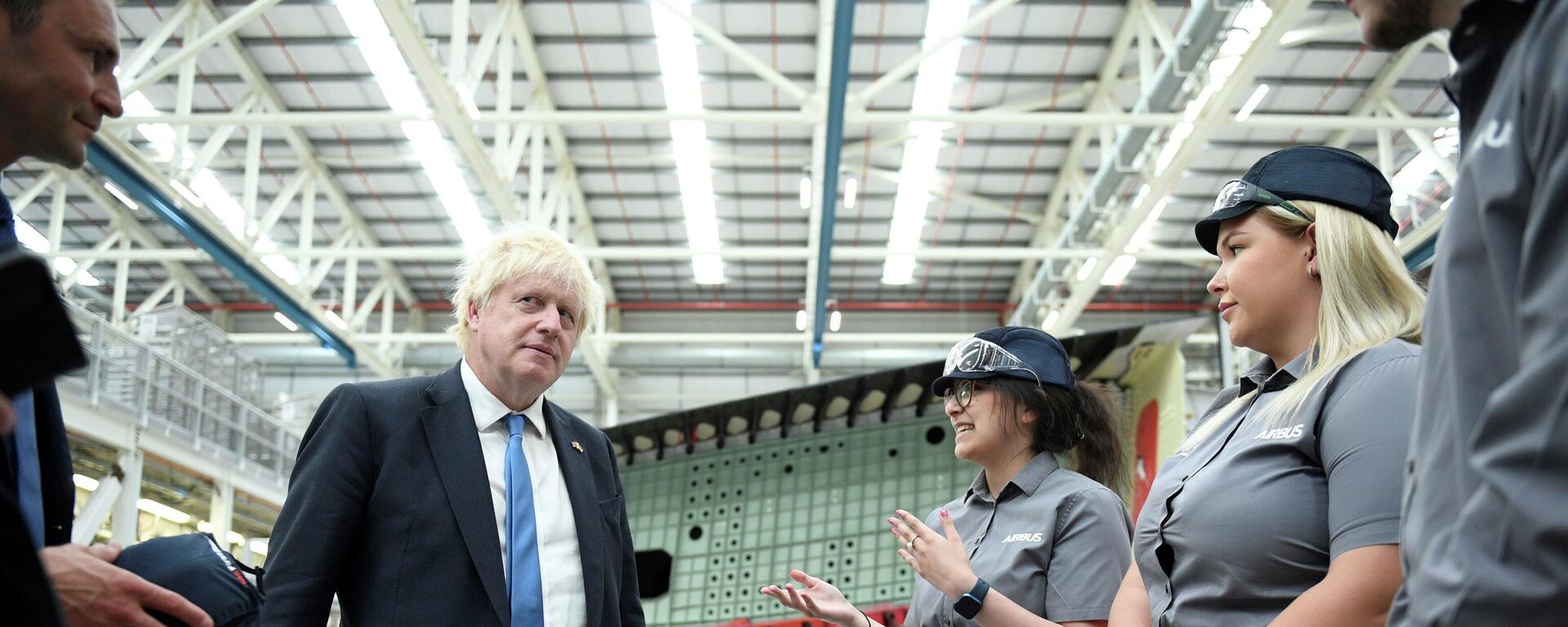https://sputnikglobe.com/20220902/new-british-pm-to-face-tough-winter--challenging-nine-months-ahead-economist-forecasts-1100321899.html
New British PM to Face Tough Winter & Challenging Nine Months Ahead, Economist Forecasts
New British PM to Face Tough Winter & Challenging Nine Months Ahead, Economist Forecasts
Sputnik International
Whoever takes the reins of the UK government on September 5 will have to cope with galloping inflation, an unfolding recession, soaring energy costs and a... 02.09.2022, Sputnik International
2022-09-02T17:23+0000
2022-09-02T17:23+0000
2023-05-28T15:20+0000
analysis
recession
inflation
liz truss
energy
russia
sanctions
united kingdom (uk)
https://cdn1.img.sputnikglobe.com/img/105462/71/1054627180_0:104:1920:1184_1920x0_80_0_0_fc667e5c4648a56ad9ab64d9f869d074.jpg
UK inflation could reach a staggering 22.4% in 2023 with gross domestic product (GDP) potentially contracting by 3.4% if energy prices continue to rise, US investment bank Goldman Sachs warned earlier this week.Lacalle noted that "most” of the unfolding situation “comes from the energy crisis,” and, in his opinion, could not have been prevented."In fact, the low unemployment shows that the economy would have been strong in a normal energy environment," the economist argued.Last Friday, UK energy regulator Ofgem announced an 80% increase in the energy price cap to £3,549 ($4,194) per year starting October 1, as energy prices continued to race in Europe. Since its last revision in April, the energy price cap has stood at £1,971. In October 2021, the price cap amounted to 1,277 pounds.Europe's "green policies" and post-COVID economic recovery created pressure on the global energy sector sending prices higher in 2021. The EU and the UK's sweeping anti-Russian sanctions and decision to reduce their reliance on the country's oil and gas have complicated the situation even further.On September 5, the name of a new UK prime minister will be announced, with Liz Truss the favorite in the race. During the final hustings in London on Wednesday, Truss promised no energy rationing and pledged not to raise taxes or cut existing ones regardless of soaring inflation and black-out threats.However, some British economists do not share Lacalle's opinion, warning that tax cuts are not a remedy. "The candidates may be promising irresponsible tax cuts and not understanding how the economy works but the public debate is more mature and in the end the right policies could emerge," noted British academic and author Rodney Atkinson in his July interview with Sputnik.Likewise, Iain Begg, professor at the European Institute of the London School of Economics and Political Science, does not rule out that the new UK government will be forced to go back on its pledge to avoid energy rationing.Meanwhile, the British Chamber of Commerce (BCC) forecast that the UK will enter recession before the end of this year, adding that growth is also expected to be weak into 2023 and 2024.The BCC's prognosis reads that the UK economy may record three consecutive quarters of contraction - which falls under the definition of a recession - in 2022. The entity also puts unemployment at 3.8% this year and 4.1% in 2023 and 2024.
https://sputnikglobe.com/20220902/uk-manufacturers-face-bleak-winter-as-worst-energy-crisis-since-1970s-bites-1100318864.html
russia
united kingdom (uk)
Sputnik International
feedback@sputniknews.com
+74956456601
MIA „Rossiya Segodnya“
2022
News
en_EN
Sputnik International
feedback@sputniknews.com
+74956456601
MIA „Rossiya Segodnya“
Sputnik International
feedback@sputniknews.com
+74956456601
MIA „Rossiya Segodnya“
recession, inflation, liz truss, energy, russia, sanctions, united kingdom (uk)
recession, inflation, liz truss, energy, russia, sanctions, united kingdom (uk)
New British PM to Face Tough Winter & Challenging Nine Months Ahead, Economist Forecasts
17:23 GMT 02.09.2022 (Updated: 15:20 GMT 28.05.2023) Whoever takes the reins of the UK government on September 5 will have to cope with galloping inflation, an unfolding recession, soaring energy costs and a swirling cost of living crisis.
UK inflation could reach a staggering 22.4% in 2023 with gross domestic product (GDP) potentially contracting by 3.4% if energy prices continue to rise, US investment bank Goldman Sachs warned earlier this week.
"It is very difficult to see accurate estimates," said Daniel Lacalle, chief economist and investment officer at Tressis Gestion. "However, it is clearly a very dangerous and worrying situation. The UK faces a tough winter and very challenging nine months ahead."
Lacalle noted that "most” of the unfolding situation “comes from the energy crisis,” and, in his opinion, could not have been prevented.
"In fact, the low unemployment shows that the economy would have been strong in a normal energy environment," the economist argued.

2 September 2022, 17:11 GMT
Last Friday, UK energy regulator Ofgem announced an 80% increase in the energy price cap to £3,549 ($4,194) per year starting October 1, as energy prices continued to race in Europe. Since its last revision in April, the energy price cap has stood at £1,971. In October 2021, the price cap amounted to 1,277 pounds.
Europe's "green policies" and post-COVID economic recovery created pressure on the global energy sector sending prices higher in 2021. The EU and the UK's sweeping anti-Russian sanctions and decision to reduce their reliance on the country's oil and gas have complicated the situation even further.
On September 5, the name of a new UK prime minister will be announced, with Liz Truss the favorite in the race. During the final hustings in London on Wednesday, Truss promised no energy rationing and pledged not to raise taxes or cut existing ones regardless of soaring inflation and black-out threats.
"The policies that Liz Truss proposes could be a strong solution. Lower taxes and let businesses go through a difficult period with less burdens," suggested Lacalle.
However, some British economists do not share Lacalle's opinion,
warning that tax cuts are not a remedy. "The candidates may be promising irresponsible tax cuts and not understanding how the economy works but the public debate is more mature and in the end the right policies could emerge," noted British academic and author Rodney Atkinson in his July interview with Sputnik.
Likewise, Iain Begg, professor at the European Institute of the London School of Economics and Political Science, does not rule out that the new UK government
will be forced to go back on its pledge to avoid energy rationing.
"A commitment made on a warm August evening about not rationing energy might have to be abandoned if cold Siberian winds hit the UK in February," Begg told Sputnik on September 1.
Meanwhile, the British Chamber of Commerce (BCC) forecast that
the UK will enter recession before the end of this year, adding that growth is also expected to be weak into 2023 and 2024.
The BCC's prognosis reads that the UK economy may record three consecutive quarters of contraction - which falls under the definition of a recession - in 2022. The entity also puts unemployment at 3.8% this year and 4.1% in 2023 and 2024.



